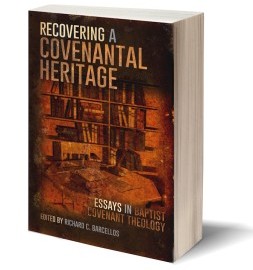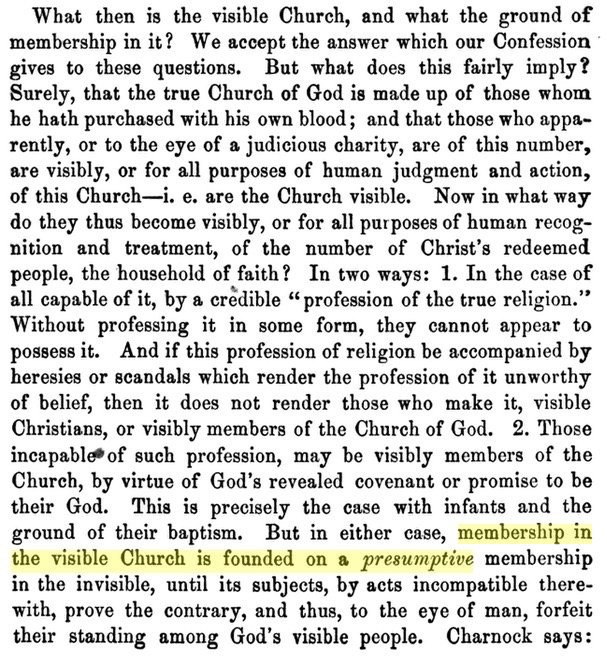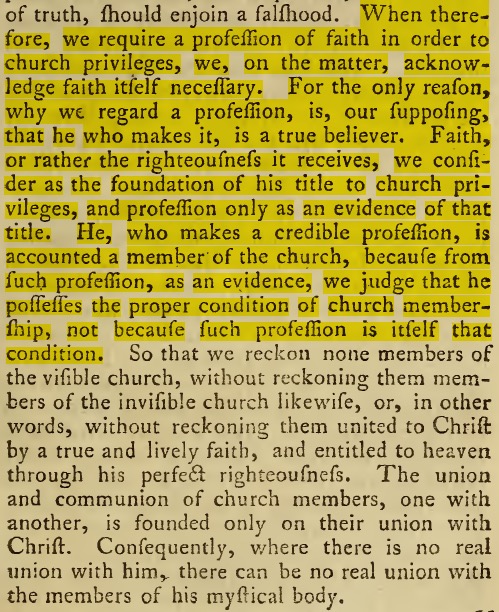Books
Recovering a Covenantal Heritage
Introduction, James M. Renihan, Ph.D.
1. A Brief Overview of Seventeenth-Century Reformed Orthodox Federalism, Richard C. Barcellos, Ph.D.
2. Covenant Theology in the First and Second London Confessions of Faith, James M. Renihan, Ph.D….
Order Paperback Order on Kindle
It is with great joy that we announce the publication of Recovering a Covenantal Heritage. Many of you have been waiting for this book since 1689Federalism.com was launched in June 2013 and you will not be disappointed.
Reading the book stirred up a love for and worship of the Lord. It thoroughly developed in me a desire to see the church reformed according to the Word of God (Ch. 4) because, as Michael T. Renihan notes in Chapter 6 “The recovery of right baptism was Tombes’ personal, yet godly, obsession. He was concerned with the right practice of this ordinance for the good of man’s soul, not to win a theological point. The debate that raged in the seventeenth century was more than the mere academic production of print on paper. Tombes really believed that the right doctrine would have major repercussions in the church-at-large. I believe that Tombes was right on target. These ripples still affect the churches of our day.”
That said, make sure to take note of Richard Barcellos’ note in the preface: “It in no way pretends to be a fully worked-out Baptist covenant theology. It contains essays by thirteen different authors who do not necessarily advocate the fine details of every contribution, something that is quite common with multiple-author works.”
For example, in Chapter 3 (“By Farther Steps: A Seventeenth-Century Particular Baptist Covenant Theology”) Pascal Denault explains “Samuel Petto considered that the Old Covenant did not have the same function for Israel as for Christ. For Israel it was a national covenant by whose conditions she received blessings and curses in its land (Deut. 28). For Christ, it was a covenant of works for which he had to accomplish righteousness actively and passively (Rom. 5:18-20; 8:3-4; Gal. 3:13; 4:4-5).” And goes on to note “This explanation from Petto demonstrates how he himself, and most of the Particular Baptists, considered that the covenant of works was reaffirmed with a different goal than at its first promulgation.”
While on the other hand, in Chapter 16 (“Reformed Baptist Covenant Theology and Biblical Theology”) Micah and Samuel Renihan are clear that “tenure in the land was what was in view in the Mosaic law [and all of the Old Covenant]” (not eternal life). And in Chapter 7 (“John Owen on the Mosaic Covenant”), Thomas E. Hicks, Jr. clarifies that Owen “did not believe that the Mosaic Covenant extended the promise of spiritual or eternal life at all… The Mosaic Covenant contained a reminder of the covenant of works, announcing the terms that belonged not to itself, but to the original covenant of works with Adam… what was promised to the Israelites for their faith, love, and obedience under the Mosaic Covenant was not eternal life (spiritual reality), but temporal, earthly blessings, including land and physical prosperity (physical picture).” And thus, Christ did not fulfill the terms of the Old Covenant for believers. Christ fulfilled his own covenant of works, the Covenant of Redemption.
[Note: Most particular baptists expressed agreement with Owen on this point, rather than Petto. Pascal Denault has since changed his stance on this. See the Q&A session of his recent lectures on 1689 Federalism for the Reformed Baptist Seminary.]Jeffery D. Johnson holds to Petto’s view, yet his excellent Chapter 9 (“The Fatal Flaw of Infant Baptism: The Dichotomous Nature of the Abrahamic Covenant”) is written broadly enough to be interpreted in light of either view, depending on how one views the typology of the Abrahamic Covenant.
For more on this point, see Republication, the Mosaic Covenant, and Eternal Life.
Also note that James White’s essay, at a couple of points portrays a slight “20th Century Reformed Baptist” view which may stand out to the careful reader (his comments regarding “extensiveness”). However, this does not detract from his superb polemic, which sufficiently demonstrates Westminster Federalism’s inability to deal with the text of Hebrews.
You may find a few other minor points of disagreement between the chapters, but as a whole the book puts forward tremendous insights that should inform our understanding of the church and of God’s work in redeeming her.
The book is available at Reformed Baptist Academic Press and Amazon.
And when you are done reading the book, make sure to “share all good things with the one who teaches” by letting these men know how much you appreciate their labor of love. It is not easy work.
Table of Contents
Introduction, James M. Renihan, Ph.D.
Historical
1. A Brief Overview of Seventeenth-Century Reformed Orthodox Federalism, Richard C. Barcellos, Ph.D.
2. Covenant Theology in the First and Second London Confessions of Faith, James M. Renihan, Ph.D.
3. By Farther Steps: A Seventeenth-Century Particular Baptist Covenant Theology, Pascal Denault, Th.M.
4. The Puritan Argument for the Immersion of Believers: How Seventeenth-Century Baptists Utilized the Regulative Principle of Worship, Steve Weaver
5. The Antipaedobaptism of John Tombes, Michael T. Renihan, Ph.D.
6. The Abrahamic Covenant in the Thought of John Tombes, Michael T. Renihan, Ph.D.
7. John Owen on the Mosaic Covenant, Thomas E. Hicks, Jr., Ph.D.
8. A ‘Novel’ Approach to Credobaptist and Paedobaptist Polemics, Jeffrey A. Massey
Biblical
9. The Fatal Flaw of Infant Baptism: The Dichotomous Nature of the Abrahamic Covenant, Jeffrey D. Johnson
10. The Difference Between the Old and New Covenants: John Owen on Hebrews 8:6, John Owen
11. The Newness of the New Covenant (Part 1), James R. White, Th.D.
12. The Newness of the New Covenant (Part 2), James R. White, Th.D.
13. Acts 2:39 in its Context: An Exegetical Summary of Acts 2:39 and Paedobaptism (Part 1), Jamin Hübner
14. Acts 2:39 in its Context: Case Studies in Paedobaptist Interpretations of Acts 2:39 (Part 2), Jamin Hübner
15. An Exegetical Appraisal of Colossians 2:11-12, Richard C. Barcellos, Ph.D.
Biblical-Theological
16. Reformed Baptist Covenant Theology and Biblical Theology, Micah and Samuel Renihan






Comments